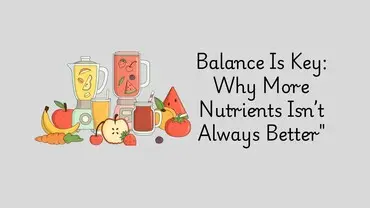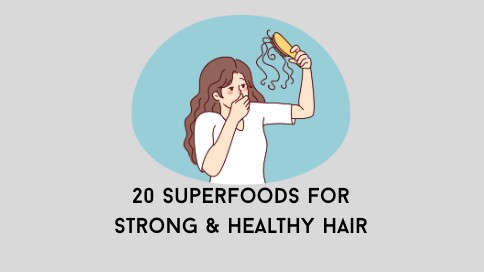Introduction
In the world of health and nutrition, much of the focus has been placed on nutrient deficiencies—lacking enough vitamins and minerals to function properly. But what about the opposite end of the spectrum? Can consuming too many nutrients be harmful? Surprisingly, yes.
While deficiencies are dangerous and often life-threatening, the overconsumption of nutrients—especially through supplements and fortified foods—can pose serious health risks. This article explores how excess nutrients can negatively impact your body, why balance is key, and how to avoid both extremes.
The Importance of Nutritional Balance
Our bodies thrive on balance. Nutrients like vitamins, minerals, carbohydrates, proteins, and fats each play essential roles in maintaining health. But just as too little can impair bodily functions, too much can overload systems and cause damage.
Nutritional balance means consuming appropriate amounts of each nutrient based on age, gender, activity level, and health status. It’s not about “more is better”—it's about "just enough."
Common Nutrients That Can Be Harmful in Excess
1. Iron
Iron is crucial for red blood cell production and oxygen transport. However, excessive iron (hemochromatosis) can lead to liver damage, heart problems, and diabetes. Many people unknowingly consume too much iron through multivitamins or fortified cereals.
2. Vitamin A
Known for promoting vision and immunity, vitamin A can be toxic in large amounts. Hypervitaminosis A may cause liver damage, bone thinning, and even birth defects during pregnancy.
3. Calcium
Calcium supports bone health, but too much can lead to kidney stones, impaired absorption of other minerals (like iron and zinc), and cardiovascular issues due to calcification in arteries.
4. Vitamin D
Often taken to boost mood and immunity, excess vitamin D can cause calcium build-up in the blood (hypercalcemia), leading to nausea, weakness, and kidney problems.
5. Selenium
Essential in small amounts, too much selenium can cause hair loss, fatigue, nerve damage, and a metallic taste in the mouth.
The Rise of Over-Supplementation
The supplement industry is booming. With wellness influencers promoting high-dose vitamins and powders, many individuals take supplements daily—sometimes without medical advice. This self-prescription often leads to nutrient imbalances.
People assume that because something is “natural” or “essential,” more of it must be good. This is a dangerous misconception. Unlike food sources, supplements can deliver nutrients in concentrated doses that the body might not be able to regulate effectively.
Fortified Foods: A Double-Edged Sword
Food fortification has helped reduce deficiencies globally—like iodine in salt or folic acid in bread. However, excessive reliance on fortified foods can lead to nutrient overload, especially when combined with supplements.
Children and elderly individuals are particularly vulnerable, as their nutrient needs are lower. A bowl of fortified cereal with milk and a multivitamin can easily exceed the recommended daily intake for several nutrients.
Symptoms of Nutrient Overload
While nutrient deficiencies often show clear signs (fatigue, weakness, hair loss), overload symptoms may be subtle or mistaken for other health issues.
Common symptoms include:
Nausea or vomiting
Muscle weakness
Irregular heartbeat
Mood changes
Abdominal pain
Liver or kidney stress
If you’re experiencing these and regularly take supplements or eat fortified foods, consult a healthcare provider.
Long-Term Health Risks of Excess Nutrients
Excess nutrient intake doesn’t always cause immediate harm, but long-term effects can be severe. For instance:
Chronic vitamin A toxicity can lead to osteoporosis.
Excess iron can increase the risk of infections and liver disease.
High calcium levels may contribute to heart disease.
Nutrient toxicity may also interfere with the absorption of other essential nutrients, leading to a secondary deficiency despite high overall intake.
Who Is at Risk?
Anyone can experience nutrient overload, but certain groups are more vulnerable:
Health-conscious individuals who over-supplement
Bodybuilders or athletes consuming protein powders or meal replacements
Pregnant women taking high-dose prenatal vitamins without supervision
Elderly adults with reduced kidney function
Children due to lower daily requirements
How to Maintain Nutritional Balance
1. Prioritize Whole Foods
Whole foods provide nutrients in appropriate amounts and combinations. They also contain fiber and other compounds that help regulate absorption.
2. Read Labels
Check both supplement and food labels for nutrient content. You might be surprised how much you’re consuming unintentionally.
3. Avoid Mega-Doses Unless Prescribed
Stick to the recommended daily allowance (RDA) unless advised otherwise by a doctor. More isn’t always better.
4. Get Regular Blood Tests
Routine tests can help you monitor your nutrient levels and catch imbalances early.
5. Consult a Nutritionist or Doctor
Before beginning any supplement regimen, get professional advice based on your unique health needs and diet.
Conclusion
Just as nutrient deficiencies can lead to serious health problems, excessive intake can be equally dangerous. In our modern world—where food is often fortified and supplements are abundant—nutrient overload is becoming a silent epidemic.
Maintaining a well-balanced diet, staying informed, and making mindful choices are key to protecting your health. Remember, in nutrition, balance beats abundance.
FAQs
1. Can you get sick from too many vitamins?
Yes, consuming high doses of certain vitamins—especially fat-soluble ones like A, D, E, and K—can cause toxicity and lead to symptoms like nausea, liver damage, or bone loss.
2. Is it possible to overdose on nutrients through food alone?
It’s rare but possible, especially with highly fortified foods. However, most cases of nutrient overdose occur through supplements rather than whole foods.
3. What are the signs of nutrient toxicity?
Common signs include fatigue, headaches, nausea, muscle weakness, and irregular heartbeats. Blood tests can confirm toxicity levels in many cases.
4. How can I prevent taking too many supplements?
Always consult a healthcare provider before starting supplements, stick to RDAs, and regularly review all the vitamins and fortified foods you consume.
5. Why is nutritional balance more important than high intake?
Your body needs nutrients in specific proportions. Too much of one nutrient can impair the absorption or function of others, leading to imbalances and health problems.






No comments yet. Be the first to comment!